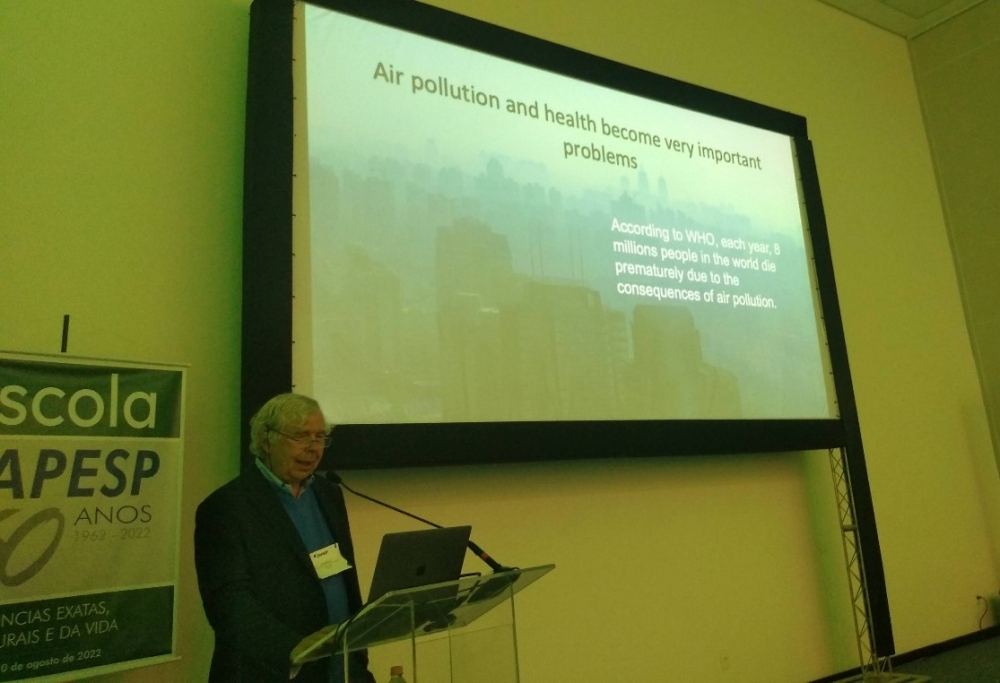

The need to adapt was emphasized by Guy Brasseur, director of the Max Planck Institute for Meteorology, Nobel Peace Laureate in 2007, and keynote speaker on the last day of the FAPESP 60 Years School (photo: André Julião/Agência FAPESP)
The need to adapt was emphasized by Guy Brasseur, director of the Max Planck Institute for Meteorology, Nobel Peace Laureate in 2007, and keynote speaker on the last day of the FAPESP 60 Years School.
The need to adapt was emphasized by Guy Brasseur, director of the Max Planck Institute for Meteorology, Nobel Peace Laureate in 2007, and keynote speaker on the last day of the FAPESP 60 Years School.

The need to adapt was emphasized by Guy Brasseur, director of the Max Planck Institute for Meteorology, Nobel Peace Laureate in 2007, and keynote speaker on the last day of the FAPESP 60 Years School (photo: André Julião/Agência FAPESP)
By André Julião in Itatiba | Agência FAPESP – The forecast that Earth’s average temperature will rise 2 degrees Celsius (°C) by the end of the century has not been taken seriously by most governments and corporations around the world.
Even if all the countries that have undertaken to reduce emissions of carbon dioxide (CO2) fulfill their commitments, global temperatures are likely to continue rising. Mitigation must remain a priority, but we must also prepare to adapt to a rise of 3°C-5°C by 2100. This is the view of climate scientist Guy Brasseur, Director of the Max Planck Institute for Meteorology in Germany.
Brasseur was a member of the United Nations Intergovernmental Panel on Climate Change (IPCC) when it shared the Nobel Peace Prize with Al Gore in 2007. He was the keynote speaker on the last day of the FAPESP 60 Years School on Exact, Natural and Life Sciences that took place on August 7-10, 2022, in Itatiba, São Paulo state, Brazil.
“The future course of the average temperature depends a lot on the emissions we produce in the coming decades. We don’t know how much the world will emit. We can see that some countries are emitting much more than in the past, while others are limiting their emissions. If we want to keep global warming below 2°C to the end of the century, we must cut emissions very sharply by 2040 or 2050,” Brasseur told Agência FAPESP shortly after delivering the address that concluded the event.
The uncertainty about future emissions should make current scientific efforts focus above all on finding ways to adapt to a global temperature rise of more than 2°C, he added.
“When we ask countries what they’ll do to limit warming, they send a message about the measures to be taken. The current view is that the global average will rise 3°C or 3.5°C if everything that’s been programmed to happen actually does happen,” he said.
Projections for 2050 suggest the impact. The world population will reach 9 billion and annual greenhouse gas emissions will total 6 million tons, not to mention 60 million tons of polluting gases in urban centers.
Predictions and projections are not required when it comes to thinking about health hazards. The World Health Organization (WHO) estimates the number of annual premature deaths due to air pollution at 8 million per year right now.
A reduction in CO2 emissions of the magnitude required to avoid even more intense global warming entails a profound transformation of society. The changes must take place in all sectors, from obvious ones such as electricity generation to others not always remembered. “The computer sector currently accounts for 10% of total emissions,” Brasseur noted in his presentation.
The great transformation
The measures proposed to combat emissions range widely, from decarbonizing the economy to reducing inequality. “It’s not easy to do. It basically requires a profound change in our society,” Brasseur said.
The ongoing actions in some countries involve climate service centers. One of these, set up in Germany in 2009 by Brasseur, develops prototypes of products and services to support decision-makers in politics, business and public administration in making the transformations needed for adaptation to climate change.
“We know that governments and companies have their own pace and their own definition of what’s urgent, so the climate service centers are designed to create a dialogue among communities, decision-makers and business organizations to help everyone become more aware of the problem and achieve more progress,” he said. “If we can persuade the 100 largest companies in the world to change the way they do business and if they actually do so, all the others will follow suit. The main difficulty is still how to communicate this and make sure every citizen on the planet knows and is ready to cooperate.”
The aim of the FAPESP 60 Years School on Exact, Natural and Life Sciences was to offer awardees of postdoctoral scholarships from 2throughout the country a chance to interact with science leaders from Brazil and abroad in various knowledge areas, and to find out about their academic careers, research interests and challenges.
The other speakers included Ana Domingos, a professor of neuroscience at the University of Oxford (UK), Barry O’Keefe, a researcher at the National Cancer Institute (USA), José Nelson Onuchic, a professor of physics at Rice University (USA), Osvaldo Novais de Oliveira Jr., director of the University of São Paulo’s São Carlos Institute of Physics (IFSC-USP), and Virgilio A. F. Almeida, a professor of computer science at the Federal University of Minas Gerais (UFMG).
More information: 60anos.fapesp.br/escola-exatas.
Republish
The Agency FAPESP licenses news via Creative Commons (CC-BY-NC-ND) so that they can be republished free of charge and in a simple way by other digital or printed vehicles. Agência FAPESP must be credited as the source of the content being republished and the name of the reporter (if any) must be attributed. Using the HMTL button below allows compliance with these rules, detailed in Digital Republishing Policy FAPESP.





